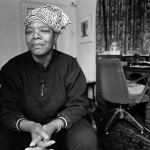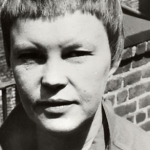The orange-peelers of Mérida, in the wrought-
iron midday, come with mechanical skewers
and live oranges, to straddle the paths
on caissons of bicycle wheels
The orange is ceremonious. Its sleep
is Egyptian. Its golden umbilicus
waits in pyramidal light, swath over swath, outwitting
the Caesars. It cannot be ravaged by knives,
but clasps its mortality in, like the skein of an asp.
The bandstand glitters like bone, in laurel
and spittle. Behind their triangular
catafalques, the orange-peelers move through the thirst
of the world with Rameses’ bounty
caulked into the hive of the peel
while ratchets and wheels spin a blazing
cosmology on their little machines. Under
skewers and handles, the orange’s skin
is pierced, the orange, in chain-mail and papyrus,
unwinds the graveclothes of Pharaoh
in a helix of ribbon, unflawed, from the navel’s
knot to the rind and the pulp underneath, like a butterfly’s
chrysalis. And sleeper by sleeper, the living turn with their thirst
to each other, the orange’s pith is broken
in a blind effervescence that perfumes the palate and burns
to the tooth’s bite.
And the dead reawaken.


















Comment form: